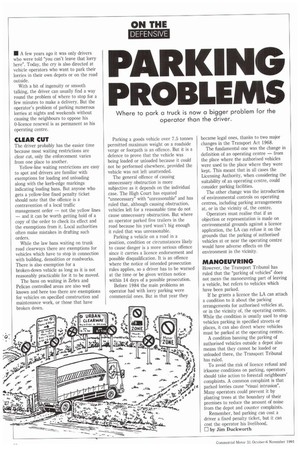PARKING
Page 38

If you've noticed an error in this article please click here to report it so we can fix it.
PROBLEMS
• A few years ago it was only drivers who were told "you can't leave that lorry here". Today, the cry is also directed at vehicle operators who want to park their lorries in their own depots or on the road outside.
With a bit of ingenuity or smooth talking, the driver can usually find a way round the problem of where to stop for a few minutes to make a delivery. But the operator's problem of parking numerous lorries at nights and weekends without causing the neighbours to oppose his 0-licence renewal is as permanent as his operating centre.
The driver probably has the easier time because most waiting restrictions are clear cut, only the enforcement varies from one place to another.
Yellow-line waiting restrictions are easy to spot and drivers are familiar with exemptions for loading and unloading along with the kerb-edge markings indicating loading bans. But anyone who gets a yellow-line fixed penalty ticket should note that the offence is a contravention of a local traffic management order — not the yellow lines — and it can be worth getting hold of a copy of the order to check its effect and the exemptions from it. Local authorities often make mistakes in drafting such orders.
While the law bans waiting on trunk road clearways there are exemptions for vehicles which have to stop in connection with building, demolition or roadworks. There is also exemption for a broken-down vehicle as long as it is not reasonably practicable for it to be moved.
The bans on waiting in Zebra and Pelican controlled areas are also well known and here too there are exemptions for vehicles on specified construction and maintenance work, or those that have broken down. Parking a goods vehicle over 7.5 tonnes permitted maximum weight on a roadside verge or footpath is an offence. But it is a defence to prove that the vehicle was being loaded or unloaded because it could not be performed elsewhere, provided the vehicle was not left unattended.
The general offence of causing unnecessary obstruction is more subjective as it depends on the individual case. The High Court has equated "unnecessary" with "unreasonable" and has ruled that, although causing obstruction, vehicles left for a reasonable time do not cause unnecessary obstruction. But where an operator parked five trailers in the road because his yard wasn't big enough it ruled that was unreasonable.
Parking a vehicle on a road in a position, condition or circumstances likely to cause danger is a more serious offence since it carries a licence endorsement and possible disqualification. It is an offence where the notice of intended prosecution rules applies, so a driver has to be warned at the time or be given written notice within 14 days of a possible prosecution.
Before 1984 the main problems an operator had with lorry parking were commercial ones. But in that year they became legal ones, thanks to two major changes in the Transport Act 1968.
The fundamental one was the change in definition of an operating centre — from the place where the authorised vehicles were used to the place where they were kept. This meant that in all cases the Licensing Authority, when considering the suitability of an operating centre, could consider parking facilities.
The other change was the introduction of environmental controls on operating centres, including parking arrangements at, or in the vicinity of, the centre.
Operators must realise that if an objection or representation is made on environmental grounds against a licence application, the LA can refuse it on the grounds that the parking of authorised vehicles at or near the operating centre would have adverse effects on the environment in the vicinity.
However, the Transport Tribunal has ruled that the "parking of vehicles" does not mean the manoeuvring part of leaving a vehicle, but refers to vehicles which have been parked.
If he grants a licence the LA can attach a condition to it about the parking arrangements for authorised vehicles at, or in the vicinity of, the operating centre. While the condition is usually used to stop vehicles parking in specified streets or places, it can also direct where vehicles must be parked at the operating centre.
A condition banning the parking of authorised vehicles outside a depot also means that they cannot be loaded or unloaded there, the Transport Tribunal has ruled.
To avoid the risk of licence refusal and irksome conditions on parking, operators should take action to forestall neighbours' complaints. A common complaint is that parked lorries cause "visual intrusion". Many operators could prevent it by planting trees at the boundary of their premises to reduce the amount of noise from the depot and counter complaints.
Remember, bad parking can cost a driver a fixed penalty ticket, but it can cost the operator his livelihood.
by Jim Duckworth




















































































